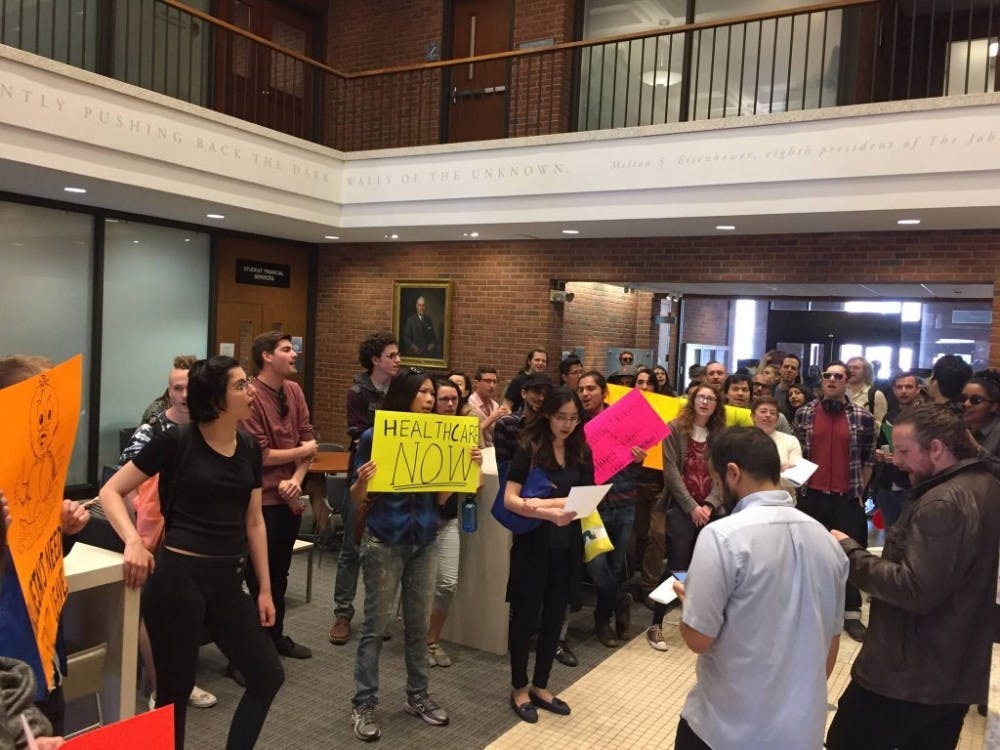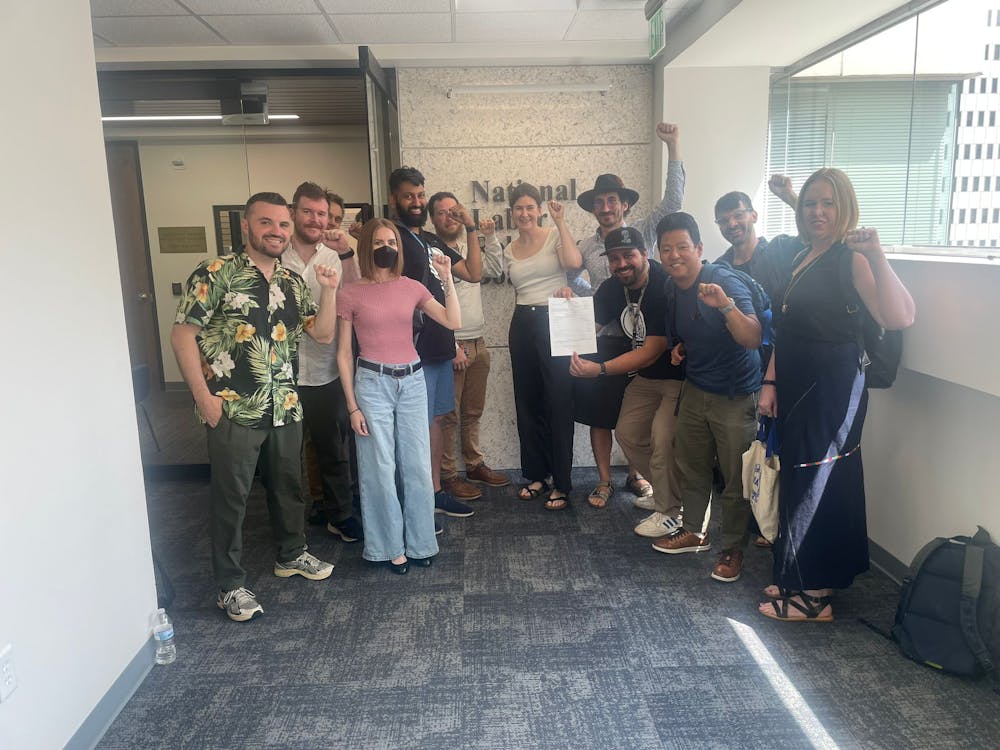Nearly 50 graduate students marched on Garland Hall to demand University healthcare reform on Friday, April 14. The demonstration was organized by Teachers and Researchers United (TRU), a coalition of graduate students.
Members of TRU met with Vice Provost for Student Affairs Kevin G. Shollenberger, Vice President for Human Resources Heidi E. Conway and Chief Risk Officer Jonathan Links on Monday, April 10 to outline their demands.
The University’s healthcare plan is mandatory for students aged 26 or older unless they have a comparable alternative plan. Many graduate students criticize the plan for its high cost, lack of accessibility and failure to cover services like dental and eye care.
Their demands are organized into three subsections: equality, accessibility and affordability. They include a fully-funded health insurance plan, family leave for graduate student parents, coverage of mental healthcare providers outside of the Counseling Center, coverage for dental and vision care, as well as STI and HIV testing.
TRU member Ding Xuan Ng, who was present at the meeting, said that while administrators were enthusiastic about responding to these demands, no timeline for future reforms was established, and no firm commitments were made.
At Garland, the protesters insisted on meeting University President Ronald J. Daniels to reiterate their demands. The protesters filled the first floor, carrying signs and chanting “Let them in now” and “Ronny D, you can’t hide, we can see your greedy side” as several of the members approached Daniels’ office with their list of grievances.
“Today’s action was about asking President Daniels to hold [administrators] accountable,” Ng said.
However, when TRU members walked up toward Daniels’ office, they were met by security personnel who said that he was not there.
“What are security personnel doing there if there is no one to protect?” Ng said.
The protesters instead delivered their grievances to Daniels through his chief of staff Kerry Ates.
“We emphasized that we expect a response and that we expect them to take us seriously,” Ng said. “If we don’t hear anything, we will be back.”
TRU member and graduate student Jishnu Guha-Majumdar criticized the University for not providing better healthcare to its students, given its reputation as a top medical school.
“We live with a fundamental hypocrisy,” Guha-Majumdar said. “[We go to] one of the schools with the best medical systems in the country, some of the best doctors in the country, some of the best healthcare in the country. And yet for graduate students, we don’t have access to this healthcare.”

The demonstration began in front of Levering Hall, where several participants related their personal struggles with the University’s healthcare plan.
In addition to recounting their own experiences, students also read aloud stories shared anonymously with TRU.
Graduate student Diego Gelsinger described how he suffered a bicycle accident that left him nearly unconscious with several cracked ribs. Instead of calling an ambulance, Gelsinger ordered an Uber to take him home.
He explained that because Hopkins requires a 20 percent co-insurance payment on ambulance costs and other healthcare services, calling an ambulance would have been too expensive. The accident also occurred on a Friday afternoon, meaning that the Student Health and Wellness Center (HelWell) was closed.
“I decided it was going to hurt me more in the long run having the debt from the ambulance ride than having that physical pain in that moment on the Uber ride,” he said.
Gelsinger said his insurance coverage made him worry about the lack of flexibility.
“I don’t think any insurance plan should make us have to worry about our coverage during an emergency when we have no way of knowing it is going to happen.”
Shortly before coming to Hopkins, graduate student Casey McNeill also suffered a bicycle accident from which she has not fully recovered.
“I’ve been dealing with the insurance plan and hospitals and medical bills since the beginning,” McNeill said.
She spoke about the medical bill she received from the accident, with which she struggled to accommodate.
“I had to have a surgery to fix the bone that I broke, so the out-of-pocket costs were around $2,500 which at that point was almost 15 percent of my take-home pay,” she said.
After her bone healed, she was supposed to undergo physical therapy for several weeks. Each appointment, however, cost $60.
Stressed out by the cost, McNeill stopped going to therapy after two weeks.
“In hindsight, I wish now that I had just sucked it up and done all of it, because I’m still having some issues,” she said. “We have to make really stupid choices.”
Last semester, the Graduate Representative Organization (GRO) conducted a survey on graduate health care. GRO then reported the results of the survey to the administration, which remained unresponsive.
In response, TRU then began a campaign that encourages students to sign postcards and share their problems with University healthcare.
The campaign allowed TRU to amass stories like those of Gelsinger and McNeill, which are shared on a Facebook page called TRU Healthcare.
“Some of these stories demonstrate that at Hopkins, a hospital visit could cost a quarter or more of your income,” Guha-Majumdar said.
He warned that unexpected medical expenses could present a serious threat.
“Even if you haven’t had issues with your health insurance yet, you’re one accident, one illness, one injury away from having to deal with our messed-up health care system,” Guha-Majumdar said.
According to Ng, Friday’s demonstration was the first step in a public campaign.
“Now that we’re public, we want to get more stories,” he said. “We want people to know how bad the situation is with healthcare for grad students at Hopkins.”
He noted that there is a lack of awareness about the healthcare system’s drawbacks throughout the Hopkins community.
“I think a lot of people, especially undergrads, alumni, faculty, they’re totally unaware,” Ng said.
He noted that many are unaware of how their inadequate healthcare plan would affect them in an emergency.
“Grad students who haven’t had to use the healthcare plan, they don’t know it’s so bad,” Ng said. “We want them to realize that if they’re even less than perfectly healthy, they’re going to struggle paying those bills.”
Ng asserted that TRU will continue pressing the administration to meet their expectations.
“We think that [the administration] will try to stretch it out for as long as they can,” he said. “They’ll try and say we need to do more research, we need to hear more views, but the truth is that we have been in consultation with them for years, and nothing’s happened. We expect them to delay, but we will keep pressuring them until they commit to some type of action.”
Correction: The article incorrectly stated that Casey McNeill paid $25,000 in out-of-pocket costs when she actually paid $2,500. Also, GRO did not work with TRU on the survey.





